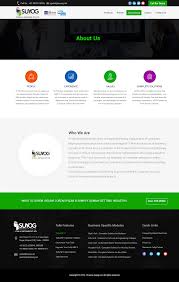Empowering Businesses: The Role of an Ecommerce App Development Company
The Rise of Ecommerce App Development Companies
As online shopping continues to dominate the retail industry, the demand for ecommerce app development companies is on the rise. These companies specialize in creating mobile applications that enable businesses to sell their products and services online, reaching a global audience and increasing revenue.
Why Choose an Ecommerce App Development Company?
Building a successful ecommerce app requires expertise in design, user experience, security, and functionality. Ecommerce app development companies have the knowledge and experience to create customized solutions that meet the unique needs of each client.
Key Services Offered by Ecommerce App Development Companies:
- App Design: Creating visually appealing and user-friendly interfaces that enhance the shopping experience.
- Mobile Compatibility: Ensuring that the ecommerce app is optimized for various mobile devices and operating systems.
- Payment Gateway Integration: Securely integrating payment gateways to facilitate smooth transactions.
- Inventory Management: Implementing systems to track inventory levels and manage product listings.
- Analytics and Reporting: Providing insights into customer behavior and sales performance through data analytics.
- Security Measures: Implementing robust security features to protect customer data and prevent fraud.
The Future of Ecommerce App Development
As technology continues to evolve, ecommerce app development companies will play a crucial role in helping businesses adapt to changing consumer preferences and market trends. By staying ahead of the curve and leveraging innovative solutions, these companies empower businesses to thrive in the competitive world of online retail.
In conclusion, ecommerce app development companies are essential partners for businesses looking to establish a strong online presence and drive growth through digital channels. With their expertise and dedication, these companies are shaping the future of ecommerce one app at a time.
Top 7 FAQs About Ecommerce App Development Companies: Services, Costs, and More
- 1. What services do ecommerce app development companies offer?
- 2. How long does it take to develop an ecommerce app?
- 3. What factors determine the cost of developing an ecommerce app?
- 4. Can ecommerce app development companies integrate payment gateways into the app?
- 5. Do ecommerce app development companies provide maintenance and support services after the app is launched?
- 6. How can I ensure the security of my ecommerce app developed by a company?
- 7. Are ecommerce apps developed by these companies compatible with both Android and iOS devices?
1. What services do ecommerce app development companies offer?
Ecommerce app development companies offer a range of services tailored to meet the specific needs of businesses looking to establish or enhance their online presence. These services typically include app design, ensuring a visually appealing and user-friendly interface; mobile compatibility, optimizing the app for various devices and operating systems; payment gateway integration for secure transactions; inventory management systems for tracking products; analytics and reporting tools for insights into sales performance; and robust security measures to protect customer data. By providing these comprehensive services, ecommerce app development companies help businesses create effective and efficient digital platforms to drive online sales and enhance customer experiences.
2. How long does it take to develop an ecommerce app?
When it comes to developing an ecommerce app, the timeline can vary depending on various factors such as the complexity of the app, features required, design intricacies, and integration of third-party services. On average, developing a fully functional ecommerce app can take anywhere from a few weeks to several months. It is crucial for ecommerce app development companies to conduct a thorough analysis of the project requirements and provide a realistic timeline based on the scope of work to ensure timely delivery without compromising on quality.
3. What factors determine the cost of developing an ecommerce app?
When considering the cost of developing an ecommerce app, several key factors come into play. The complexity of the app’s features and functionalities, the design intricacy, the level of customization required, integration with third-party services such as payment gateways, and the platform compatibility all contribute to determining the overall cost. Additionally, factors like scalability, security measures, ongoing maintenance needs, and post-launch support also impact the development cost. It is essential for businesses to carefully evaluate these factors and work closely with a reputable ecommerce app development company to establish a budget that aligns with their goals and requirements.
4. Can ecommerce app development companies integrate payment gateways into the app?
Yes, ecommerce app development companies specialize in integrating payment gateways into mobile applications. Payment gateway integration is a crucial aspect of ecommerce apps as it allows customers to securely make transactions within the app. These companies have the expertise to seamlessly incorporate popular payment methods such as credit cards, digital wallets, and other online payment systems into the app, ensuring a smooth and secure checkout process for users. By leveraging their technical skills and industry knowledge, ecommerce app development companies can provide tailored solutions that meet the specific requirements of each client while adhering to the highest standards of security and compliance.
5. Do ecommerce app development companies provide maintenance and support services after the app is launched?
Yes, ecommerce app development companies typically offer maintenance and support services after the app is launched. These services are essential to ensure that the app continues to function smoothly, remains secure, and adapts to any changes in technology or business requirements. Maintenance may include updates for new operating system versions, bug fixes, performance optimizations, and security patches. Additionally, support services provide assistance to address any issues or queries that users may encounter while using the app. By providing ongoing maintenance and support, ecommerce app development companies help their clients maximize the longevity and effectiveness of their ecommerce applications.
6. How can I ensure the security of my ecommerce app developed by a company?
Ensuring the security of your ecommerce app developed by a company is paramount in safeguarding sensitive customer information and maintaining trust. To enhance app security, it is crucial to work with a reputable ecommerce app development company that prioritizes robust security measures. Look for companies that implement encryption protocols, secure payment gateways, regular security audits, and compliance with industry standards such as PCI DSS. Additionally, discuss data protection practices, access controls, and secure coding techniques with the development team to ensure that your ecommerce app is fortified against potential cyber threats and vulnerabilities. By collaborating closely with the development company on security considerations throughout the app development process, you can create a secure and resilient ecommerce platform for your business and customers.
7. Are ecommerce apps developed by these companies compatible with both Android and iOS devices?
One of the frequently asked questions regarding ecommerce app development companies is whether the ecommerce apps they develop are compatible with both Android and iOS devices. The answer to this question is typically yes. Ecommerce app development companies strive to create apps that are cross-platform compatible, ensuring that users on both Android and iOS devices can access and use the app seamlessly. By leveraging technologies like React Native or Flutter, these companies can develop apps that offer a consistent user experience across different operating systems, enabling businesses to reach a wider audience and maximize their online presence.










